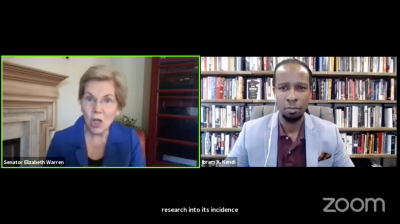
The Boston University Center for Antiracist Research partnered with the School of Public Health to hold a three-part series of lectures discussing the racial disparities in health care Monday, Tuesday and Wednesday last week.
The events delved into the possible applications of data and research into public policy, focusing on the deep health-related inequities tied to race that were highlighted by the COVID-19 pandemic.
Meredith Brown, assistant director of strategic initiatives at SPH, said planning for the event began at the start of the pandemic with the SPH and the Center holding preliminary discussions almost one year ago.
“We ended up coming up with anti-racism and health policy really being the main theme for the program,” Brown said. “Looking specifically at the COVID-19 pandemic and how it was able to highlight pre-existing racial disparities in health.”
Monday focused on the convergence of race, data and the pandemic in terms of anti-racist health policy with a conversation between Dean of SPH Sandro Galea and Ibram X. Kendi, director and founder of the Center.
“Anti-racist health policy presupposes that there’s nothing behaviorally wrong with the group that’s on the dying or the sick end of a particular racial health disparity,” Kendi said. “Therefore, it presupposes that there’s policies and practices in our society, there are conditions and structures and systems that are leading to these racial health disparities.”
The panelists discussed the importance of collecting information and statistics on race, which was followed by a moderated discussion and Q&A from the audience that closed off the day’s proceedings.
Tuesday’s lecture featured Rep. Ayanna Pressley, D-Mass., as the keynote lecturer and centered around the possibility of bridging public health research and policy.
The Rockefeller Foundation-Boston University 3-D Commission — an organization that uses data science to determine effective public health policies — joined the SPH and the Center as a co-host.
Panel presentations featured speakers with backgrounds in public health policy, specifically as it relates to disparities and minorities.
“Given that it was policy-driven,” Brown said, “we thought it just made a lot of sense to have government officials.”
Wednesday closed off the series with a review of potential anti-racist policy solutions based on data with Kendi and Sen. Elizabeth Warren, D-Mass.
The day’s speakers included a range of professionals from both medicine and policy fields in an effort to inspire connection between the two industries, Brown said.
“It was such an honor to be able to host Congresswoman Pressley and Senator Warren,” Brown said. “We figured it made sense to have them as the keynotes, given that policy was the overarching theme.”
Brown noted it was important to ensure both sides of the issue — theoretical and practical — were represented, which is why including a combination of scholars and government representatives in the panels was a priority.
She added SPH was proud of the event’s turnout throughout the three days it was held.
“We were very pleased with the attendance,” Brown said. “We think we reached a pretty wide audience and I think we had almost 10,000 people across the three days.”
Anita DiNitto, a licensed independent social worker in New Hampshire and from Boston, was one of the audience members.
“This 3-part series has been the most inspirational, informative and data-driven presentation on health inequity, social determinants of health and social and racial justice that I have attended in my near 30 year career as a Clinical Social Worker,” DiNitto wrote in an email.
DiNitto noted that she enjoyed the conversations between Kendi and Warren as well as Pressley’s address, citing them all as “personal heroes” of hers.
“It was simply magical,” DiNitto wrote, “to see and hear their conversations with each other.”
New England Institute of Technology Director and Master of Public Health Program Magali Angeloni also attended the event and noted in an email BU was doing “fantastic work” in this field by including leaders in equity and fostering discussion.
“I’ve attended the series and learned a lot,” she wrote, “not only from the leaders and brilliant scholars, but also from the comments from others and the questions posted.”
In closing the event, Galea thanked panelists and attendees, noting his own personal satisfaction with the series.
“It really has been the most dynamic and engaged conversation from participants of any event I’ve ever been a part of,” he said.























































































































